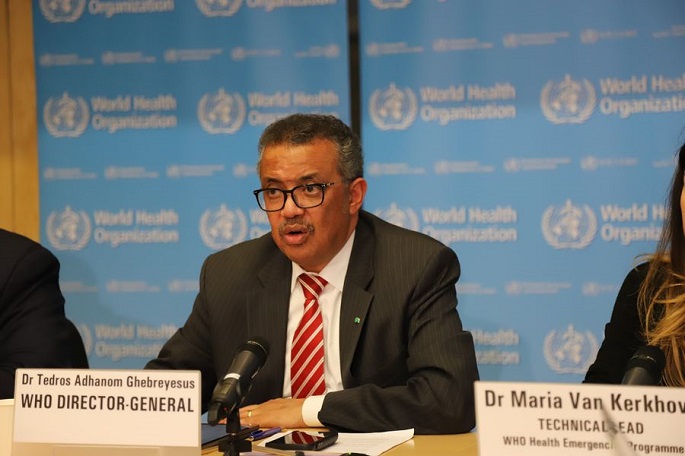Europe, now epicenter of pandemic : WHO
Published : 14 Mar 2020, 02:27
Updated : 14 Mar 2020, 02:29
Europe, which has become the epicenter of the COVID-19 pandemic, according to World Health Organization (WHO) chief on Friday, is now fully mobilized in hammering out extraordinary measures to curb the spreading of the novel coronavirus.
EPICENTER OF PANDEMIC
"Europe has now become the epicenter of the pandemic with more reported cases and deaths than the rest of world combined apart from China," WHO Director-General Tedros Adhanom Ghebreyesus noted at a daily briefing in Geneva.
As of Friday morning, 28,297 cases have been reported in the European Union/European Economic Area, among whom 1,191 people lost their lives, according to the European Center for Disease Prevention (ECDP).
Italy, the hardest-hit country, reported 250 new coronavirus deaths, taking the toll to 1,266, with 17,660 infections overall, a rise of 2,547 since Thursday evening.
Three-digit or close to four-digit increase were reported in big countries, bringing tolls up in Spain (4,334 infection, 122 deaths), France (3,661, 79), Germany (3,062, 8) and the United Kingdom (798, 11).
Smaller-sized nations suffered no less. In The Netherlands, the number of deaths rose from five to 10 in one day, while the total of positive increased by 190 to 804. Belgium reported 160 new infections, bringing the total to 559. In Luxemburg, a country of half a million people, at least 29 people were infected.
EXTRAORDINARY MEASURES
European countries in the epicenter started to hammer out extraordinary measures including school closure, gathering ban, election delay and border closure in some places.
Italy remains under lockdown since Tuesday, with a total closure of venues and activities but for those providing basic supplies and services, such as supermarkets, pharmacies, public transports, post offices, and banks.
Spain declared a state of emergency which grants the state wide-ranging powers to limit the movement of people and vehicles, allows for the temporary seizure of property, obliges people to provide certain services, mobilizes the army and imposes rationing.
France lowered the size limit for gatherings to 100 people, instead of 1,000 previously. All nurseries and schools will be closed starting from Monday.
Museums and libraries are recommended to limit their activities or to close their doors. The country's two landmarks -- the Louvre Museum and the Eiffel Tower -- immediately followed the government directive.
In Germany, many states announced school closures. In Belgium, schools, discos, cafes and restaurants will be closed until April 3. All recreational, sports, cultural or folklore activities -- whether public or private and regardless of size -- will be cancelled.
Denmark plans to close its borders as of noon Saturday. Starting on Sunday, Poland will ban entry to the country for foreigners, and international air and train connections will be suspended.
LONG BATTLE AHEAD
Despite drastic measures, European nations admit that it would be a long battle to counter the novel coronavirus.
When announcing "state of emergency", Spanish Prime Minister Pedro Sanchez acknowledged this was just the "first phase" of the battle and that "very difficult weeks lie ahead."
It was "impossible to rule out that we will reach 10,000 cases in the coming week," he said, adding that the measures were aimed at stopping the virus spreading "too quickly", and to ensure that "the most vulnerable people" can get the treatment they need.
When addressing his nation, French President Emmanuel Macron also noted that France is "only at the beginning of the epidemic" which brought the country into its worst sanitary crisis in a century.
For British government's Chief Scientific Adviser Patrick Vallance, probably between 5,000 and 10,000 people could have COVID-19 in the UK.
"It's not possible to stop everybody getting it (COVID-19) and it's also not desirable because you want some immunity in the population." He also said the main aim is to protect vulnerable and elderly from coronavirus.


